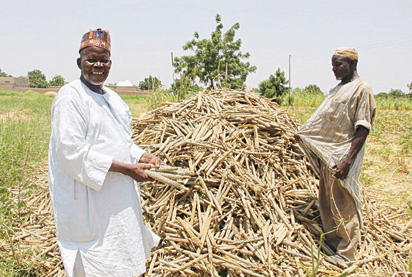The programme is co-financed by the Federal government, the Anambra State government and the five participating local government areas of Anambra East, Anambra West, Ayamelum, Awka North and Orumba North. Of the number of jobs created, 1087 were permanent engagements, while the rest were non permanent. Details showed that adult men and women got 767 permanent engagements, while youths got 320 permanent jobs. Presenting the programme’s mid –term review report in Awka when a team from the federal government and donor agencies visited Anambra State, the state coordinator of the programme, Mr. Emmanuel Agwuncha said that off-farm activities had kept many women and men in the various communities where the programme was being implemented very busy as they have been earning adequate incomes from farming activities.

According to him, the 320 permanent jobs created for the youths had been of great benefit as those who had hitherto roamed the streets had become gainfully engaged. He said that the seed entrepreneurs trained by the programme at the National Root Crops Research Institutes (NRCRI) Umudike, Abia State had become employers of labour, observing, however, that low participation of female youths in the programme was of great concern and added that efforts were being made to encourage them to develop interest in agriculture. Part of the effort to attract female youths, he said, was the introduction of the Gender Action Learning System (GALS) methodology aimed at increasing women participation in the programme. He also said that 200 hectares of land had been cultivated in the state, adding that the farms were located at Ifite-Ogwari- 50 hectares; Anaku (Ude)- 25hectares; Omasi-25hectares; Aguleri- 50 hectares; Umueri- 25 hectares and Umuikwu- 25hectares, just as six solar-powered boreholes with steel stanchion and tanks were completed in the farms. Also, he added, irrigation facilities had been put in place to ensure dry season farming in all the areas, explaining that seven processing centres were formed with total membership of 85 persons made up of 62 males and 23 females. According to him, 13 agro-processing buildings, market stores and stalls were contracted during the period under review, adding that six of them have been fully completed, while the remaining seven are between 50-90% completion. Agwuncha said that 20 kilometers of road had also been constructed at Omor, Ifite-Ogwari, Umumbo, Umueri and Anaku for use of the communities, while 1.2km road leading to cassava processing center at Igbariam farm settlement and 600m road leading to rice processing cluster at Omor were rehabilitated. “Operation and maintenance teams were institutionalized and trained within the communities to ensure sustainability of the roads. This has also imbibed sense of ownership/responsibility to the cluster communities,” Agwuncha said. Leader of the visiting team, Professor Jones Lemchi had earlier told the Commissioner for Agriculture, Mr. Afam Mbanefo that they were in the state to see what was on ground in the five participating local government areas under the programme. “Essentially, our mission is to know what has been done well, what has not been done well and areas where we need to put in ore effort. But it is not an examination,” Lemchi said.
Read more at: https://www.vanguardngr.com/2018/03/agric-programme-creates-1504-jobs-in-anambra/





